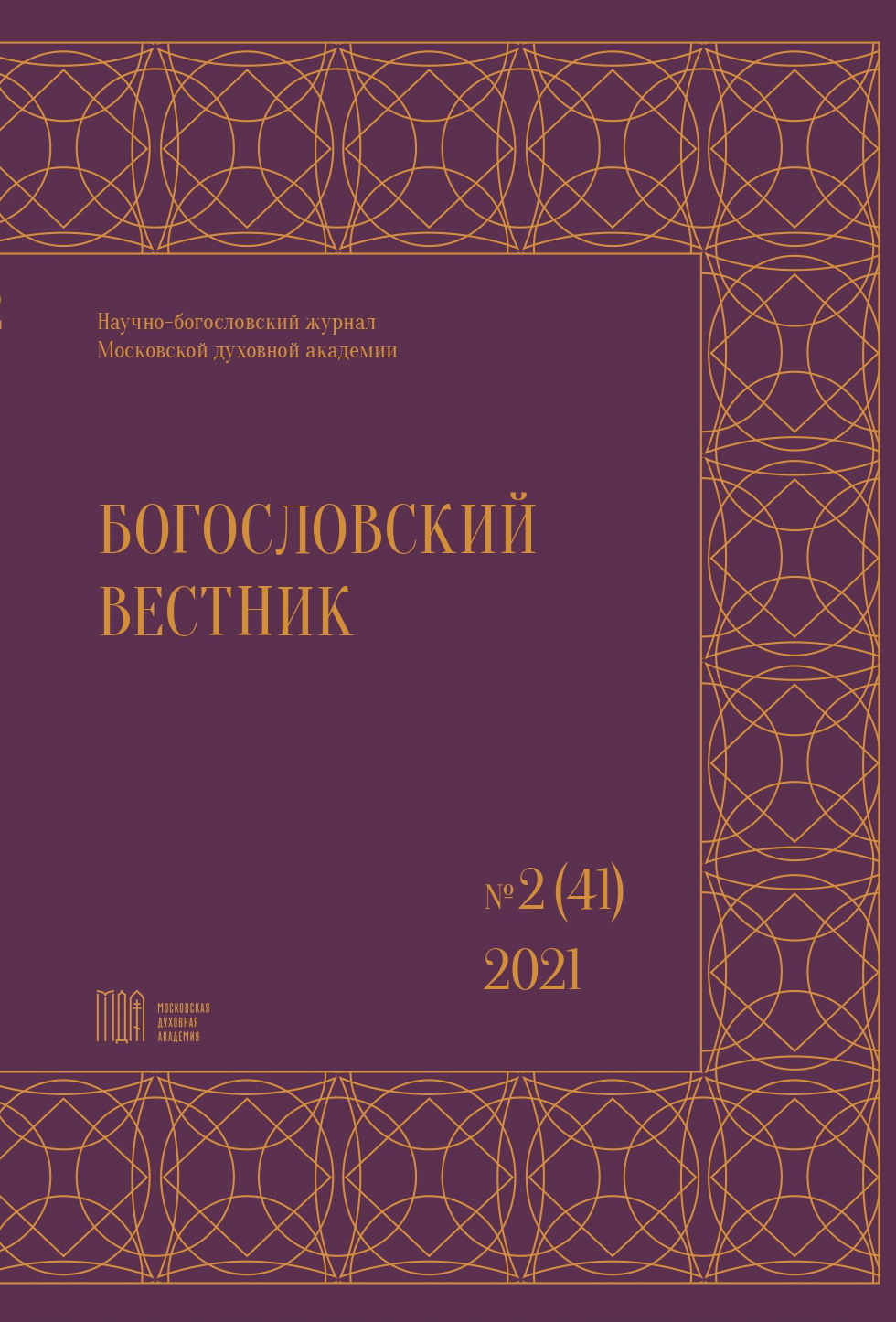Ἀναγωγή in Ancient Greek Exegetical Literature
DOI:
https://doi.org/10.31802/GB.2021.41.2.012Keywords:
exegetics, hermeneutics, ἀναγωγή, spiritual interpretation, spiritual meaning, patristic exegesisAbstract
Ἀναγωγή is quite often used in ancient monuments of Christian theological and exegetical literature in different meanings, which greatly complicates the understanding of this word in each individual case. Within the framework of the exegetical procedure, anagoge is used in a metaphorical meaning and denotes a figurative meaning, and sometimes at the same time a figurative understanding of the text, when it comes to the metaphorical content of figures of speech, or the presence of a mystical allegorical meaning. Modern Russian biblical science tends to see in ἀναγωγή a certain spiritual method/meaning of the interpretation of the Holy Scriptures (most often it means the eschatological interpretation). When this model is transferred to the soil of ancient exegetical literature, then a contradiction arises between the modern definition and the originality of the language of ancient authors. Within the framework of this article, an attempt is made to consider the main meanings of ἀναγωγή in ancient exegetical monuments.
Downloads
References
Источники
Diodorus Tarsensis. Commentarius in Psalmos / ed. J. M. Oliver. Turnhout; Leuven: Brepols; Leuven University Press, 1980 (CCSG; vol. 6).
Diodorus Tarsensis. Prologus Commentarii in Psalmum CXVIII // Recherchesde Science Religieuses / ed. L. Maries. Paris, 1919. Vol. IX. P. 90-101.
Dionysius Areopagita. De coelesti hierarchia // PG. T. 3. Col. 115-669.
Epiphanius. Adversus Octaginta haereses // PG. T. 42. Col. 9-773.
Epiphanius. Expositio fidei I I PG. T. 42. Col. 773-832.
Eusebius Caesariensis. Commentaria in Psalmos // PG. T. 23. Col. 65-1396.
Eustathius Philologus. Commentarii ad Homeri Iliadem / ed. M. van der Valk. Eustathii archiepiscopi Thessalonicensis commentarii ad Homeri Iliadem pertinentes, vols. 1; 4. Leiden: Brill, 1971; 1987.
Eustathius Philologus. Commentarii ad Homeri Odysseam / ed. G. Stallbaum. Leipzig: Weigel, 1970. Vol. 1.
Gregorius Nyssenus. Ad Graecos ex communibus notionibus // GregoriiNysseni opera. Vol. 3.1 / ed. F. Mueller. Leiden: Brill, 1958. P. 19-33.
Gregorius Nyssenus. Contra Eunomium 3 // Gregorii Nysseni Opera / ed. W. Jaeger. Leiden: Brill, I960. Vol. II.
Gregorius Theologus. Oratio 45 // PG. T. 36. Col. 623-664.
Johannes Chrysostomus. Expositiones in psalmos // PG. T. 55. Col. 35-497.
Johannes Chrysostomus. In Isaiam // PG. T. 56. Col. 11-94.
Johannes Chrysostomus. Homiliae in Matthaeum // PG. T. 57. Col. 13-472.
Johannes Chrysostomus. In Epistulam ad Ephesios homilia // PG. T. 62. Col. 5-176.
Johannes Chrysostomus. Fragmenta in proverbia // PG. T. 64. Col. 659-739.
Johannes Chrysostomus. Kommentar zu Hiob / hrsg. von U. Hagedorn and D. Hagedorn. Berlin: De Gruyter, 1990 (PTS; Bd. 35).
Justinus Martys. Cohortatio ad gentiles // Corpus apologetarum Christianorum saeculi secundi / ed. J. С. T. Otto. Jena: Mauke, 1879. Vol. 3. P. 1-37.
Maximus Confessor. Ouaestiones ad Thalassium I-LV / ed. C. Laga and C. Steel. Turnhout; Leuven: Brepols; Leuven University Press, 1980 (CCSG; vol. 7).
Maximus Confessor. Ouaestiones et dubia / ed. J. H. Declerck. Turnhout; Leuven: Brepols; Leuven University Press, 1982 (CCSG; vol. 10).
Methodius Olympi. Convivium decem virginum // PG. T. 18. Col. 27-220.
Nilus Sinaiticus. Sermo in illud: Nunc, qui habet sacculum, tollat, similiter et perram // PG. 79. Col. 1263-1280.
Origenes. Der Johanneskommentar // Origenes Werke / ed. E. Preuschen. Leipzig: J. C. Hinrichs’sche Buchhandlug, 1903. Bd. 4. (GCS; Bd. 10).
Origenes. Conre Celse / par M. Borret. Paris: Les Edition du Cerf, 1967. T. I. (SC; vol. 132).
Origenes. Contre Celse / par M. Borret. Paris: Les Edition du Cerf, 1968. T. II. (SC; vol. 136).
Origenes Werke / ed. P. Koetshau. Leipzig: J. C. Hinrichs’sche Buchhandlung, 1913 (GCS; Bd. 22).
Origenes. Ennarrationes in Iob // PG. T. 17. Col. 57-105.
Origenes. In Genesim homiliae XVI // Origenes Werke / ed. W. A. Baehrens. Leipzig: J. C. Hinrichs’sche Buchhandlung, 1920. Bd. 6. (GCS; Bd. 29).
Origenes. In Hieremiam homilia 15.2 // PG. T. 13. Col. 255-544.
Origenes. Selcta in Threnos 1,1 //PG. T. 13. Col. 605-661.
Литература
Балаховская А. С. Иоанн Златоуст как экзегет // Раннехристианская и византийская экзегетика. М.: ИМЛИ РАН, 2008. С. 119-211.
Бахвалова О. Ю., Цыб А.В. Ориген: «Анагогэ» воскресения Лазаря (Комментарий Оригена на Евангелие по Иоанну, книга XXVIII, 1-85) // ΕΙΝΑΙ: Философия. Религия. Культура. СПб.: Научно-образовательный центр проблем философии, религии и культуры ГУАП. 2017. Т. 2 (12). С. 168-188.
ДесницкийА. С. Аллегория и типология в Библии и у экзегетов древности // Восток (Oriens). 2010. №2. С. 18-26.
ДобыкинД. Г. Православное учение о толковании Священного Писания. СПб.: СПбДА, 2016.
Кожухов С. А., диак. От «буквы» к «духу»: духовное толкование апостола Павла и αναγωγή Оригена // БВ. 2019. Т. 32. № 1.С. 122-139.
Леонардов Д. С. Учение свт. Иоанна Златоуста о богодухновенности Библии // Вера и разум. 1912. № 11. С. 604-626.
Нестерова О. Е. Аллегоризм и гипербуквализм в библейских толкованиях Оригена: парадокс или единство герменевтического метода? // Восток (Oriens). 2009. № 5. С. 5-19.
Пирогов О. К. Экзегетические принципы и методы в комментариях ев. Иоанна Златоуста на послание ев. ап. Павла к Римлянам: диссертация ... кандидата богословия. Московская духовная академия. Сергиев Посад, 2009.
Протопопова И. А. Философская аллегория, поэтическая метафора, мантика: сходства
и различия // Труды Русской антропологической школы. 2004. № 1. С. 61-81.
Соловьев Р. С. Гомер как первый богослов: аллегория и символ в трактате Порфирия «О пещере нимф» // Вестник ПСТГУ. Серия III: Филология.2020. Вып. 64. С. 47-66.
Downloads
Published
How to Cite
Issue
Section
Categories
License

This work is licensed under a Creative Commons Attribution-NonCommercial 4.0 International License.








